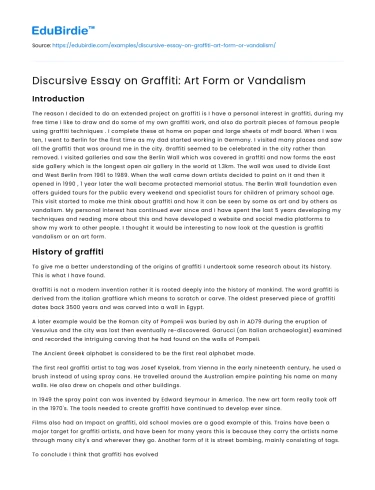Introduction
The reason I decided to do an extended project on graffiti is I have a personal interest in graffiti, during my free time I like to draw and do some of my own graffiti work, and also do portrait pieces of famous people using graffiti techniques . I complete these at home on paper and large sheets of mdf board. When I was ten, I went to Berlin for the first time as my dad started working in Germany. I visited many places and saw all the graffiti that was around me in the city. Graffiti seemed to be celebrated in the city rather than removed. I visited galleries and saw the Berlin Wall which was covered in graffiti and now forms the east side gallery which is the longest open air gallery in the world at 1.3km. The wall was used to divide East and West Berlin from 1961 to 1989. When the wall came down artists decided to paint on it and then it opened in 1990 , 1 year later the wall became protected memorial status. The Berlin Wall foundation even offers guided tours for the public every weekend and specialist tours for children of primary school age. This visit started to make me think about graffiti and how it can be seen by some as art and by others as vandalism. My personal interest has continued ever since and I have spent the last 5 years developing my techniques and reading more about this and have developed a website and social media platforms to show my work to other people. I thought it would be interesting to now look at the question is graffiti vandalism or an art form.
History of graffiti
To give me a better understanding of the origins of graffiti I undertook some research about its history. This is what I have found.
Graffiti is not a modern invention rather it is rooted deeply into the history of mankind. The word graffiti is derived from the Italian graffiare which means to scratch or carve. The oldest preserved piece of graffiti dates back 3500 years and was carved into a wall in Egypt.
A later example would be the Roman city of Pompeii was buried by ash in AD79 during the eruption of Vesuvius and the city was lost then eventually re-discovered. Garucci (an Italian archaeologist) examined and recorded the intriguing carving that he had found on the walls of Pompeii.
The Ancient Greek alphabet is considered to be the first real alphabet made.
The first real graffiti artist to tag was Josef Kyselak, from Vienna in the early nineteenth century, he used a brush instead of using spray cans. He travelled around the Australian empire painting his name on many walls. He also drew on chapels and other buildings.
In 1949 the spray paint can was invented by Edward Seymour in America. The new art form really took off in the 1970's. The tools needed to create graffiti have continued to develop ever since.
Films also had an Impact on graffiti, old school movies are a good example of this. Trains have been a major target for graffiti artists, and have been for many years this is because they carry the artists name through many city's and wherever they go. Another form of it is street bombing, mainly consisting of tags.
To conclude I think that graffiti has evolved over many years from early carvings and mark making through to where we are today.
Understanding more about graffiti






 Stuck on your essay?
Stuck on your essay?

